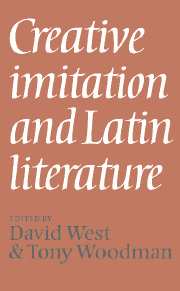Book contents
- Frontmatter
- Contents
- CONTRIBUTORS
- Prologue
- 1 DE IMITATIONE
- 2 PLAVTVS VORTIT BARB ARE: Plautus, Bacchides 526–61 and Menander, Dis exapaton 102–12
- 3 FROM POLYPHEMUS TO CORYDON: Virgil, Eclogue 2 and the Idylls of Theocritus
- 4 TWO PLAGUES: Virgil, Georgics 3.478–566 and Lucretius 6.1090–1286
- 5 HORATIAN IMITATIO AND ODES 2.5
- 6 IVDICIVM TRANSFERENDI: Virgil, Aeneid 2.469–505 and its antecedents
- 7 SELF-IMITATION WITHIN A GENERIC FRAMEWORK: Ovid, Amores 2.9 and 3.11 and the renuntiatio amoris
- 8 SELF-IMITATION AND THE SUBSTANCE OF HISTORY: Tacitus, Annals 1.61–5 and Histories 2.70, 5.14–15
- 9 LENTE CVRRITE, NOCTIS EQVI: Chaucer, Troilus and Criseyde 3.1422–70, Donne, The Sun Rising and Ovid, Amores 1.13
- 10 PYRAMUS AND THISBE IN SHAKESPEARE AND OVID: A Midsummer Night's Dream and Metamorphoses 4.1–166
- 11 EPILOGUE
- Notes
- Abbreviations and bibliography
- Select indexes
11 - EPILOGUE
Published online by Cambridge University Press: 12 March 2010
- Frontmatter
- Contents
- CONTRIBUTORS
- Prologue
- 1 DE IMITATIONE
- 2 PLAVTVS VORTIT BARB ARE: Plautus, Bacchides 526–61 and Menander, Dis exapaton 102–12
- 3 FROM POLYPHEMUS TO CORYDON: Virgil, Eclogue 2 and the Idylls of Theocritus
- 4 TWO PLAGUES: Virgil, Georgics 3.478–566 and Lucretius 6.1090–1286
- 5 HORATIAN IMITATIO AND ODES 2.5
- 6 IVDICIVM TRANSFERENDI: Virgil, Aeneid 2.469–505 and its antecedents
- 7 SELF-IMITATION WITHIN A GENERIC FRAMEWORK: Ovid, Amores 2.9 and 3.11 and the renuntiatio amoris
- 8 SELF-IMITATION AND THE SUBSTANCE OF HISTORY: Tacitus, Annals 1.61–5 and Histories 2.70, 5.14–15
- 9 LENTE CVRRITE, NOCTIS EQVI: Chaucer, Troilus and Criseyde 3.1422–70, Donne, The Sun Rising and Ovid, Amores 1.13
- 10 PYRAMUS AND THISBE IN SHAKESPEARE AND OVID: A Midsummer Night's Dream and Metamorphoses 4.1–166
- 11 EPILOGUE
- Notes
- Abbreviations and bibliography
- Select indexes
Summary
‘Imitation and self-imitation’, writes Brink, ‘are among the outstanding features of Latin poetry.’ But imitation also poses problems. In the first place, as several of our contributors have emphasized, cases where one author imitates another are difficult to establish. Similarities of word or thought or phrase can occur because writers are indebted to a common source, or because they are describing similar or conventional situations, or because their works belong to the same generic type of poem. Only patient scholarship and a thorough familiarity with the relevant material can reveal whether the similarities cannot be explained by any of these three reasons. In such cases we may be fairly certain that direct imitation of one author by another is taking place.
As is demonstrated by the contributors to this book, there are many types of imitation in Latin literature. The simplest type, a straight imitation of one author by another, is illustrated by Bain and West in their respective discussions of Plautus–Menander and Virgil–Lucretius. A more complex type is treated by Du Quesnay, who shows that in Eclogue 2 Virgil has combined imitation of two Idylls of Theocritus (contaminatio is the name which has been given to this procedure). Du Quesnay, however, goes further, and argues that from similarities between Eclogue 2 and other later poetry we can deduce that both Virgil and these later poets were also borrowing from a common source – the poetry of Gallus, which is now almost entirely lost. A similar multiplicity of antecedents is discussed by Kenney and Macleod in their analyses of Aeneid 2.469–505 and Odes 2.5 respectively.
- Type
- Chapter
- Information
- Creative Imitation and Latin Literature , pp. 195 - 200Publisher: Cambridge University PressPrint publication year: 1979
- 1
- Cited by



